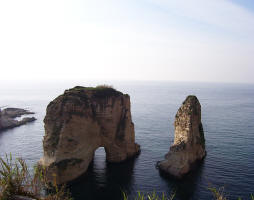 Where Middle East and North Africa Water Leaders Engage
Where Middle East and North Africa Water Leaders Engage
Where Middle East and North Africa Water Leaders Engage
The WBI team has succeeded in actively engaging the participants and providing them with a wealth of knowledge on the different aspects of utility reform, which I am confident will positively impact their future work and water outcomes in the Arab region.
Dr. Asma El Kasmi, Director of the Arab Water Academy
- Water quality is deteriorating, and water supply and irrigation services are often rationed in the MENA region.
- To help respond to these challenges, the World Bank Institute (WBI)’s Urban Water Program works with the Arab Water Academy to enhance capacity building in the water sector.
- One of the courses that WBI recently delivered at the Arab Water Academy examined core issues that managers of underperforming utilities confront on a daily basis and helps them engage in changing things around.
March 21, 2011—The Middle East and North Africa (MENA) is the world’s driest region. Water availability is around 1,200 cubic meters or 264 gallons per person per day, compared with the average of about 7,000 cubic meters worldwide.
Despite its diversity of landscapes and climates, most MENA countries cannot sustainably meet their current water demand. Half the region’s people already live under conditions of water stress. Water availability per capita is expected to halve by 2050, a trend that will likely be exacerbated as climate change makes countries hotter and drier.
Water management problems are already apparent in the region. Water quality is deteriorating, and water supply and irrigation services are often rationed—with consequences on human health, agricultural productivity, and the environment. Some 60% of the region’s water flows across international borders, further complicating the resource management challenge.
With a rising population placing increased demand on this limited resource, the MENA region is actively expanding its involvement in effective water management strategies; good water management here matters even more than it does elsewhere. The greatest challenge lies in building competent, efficient, business-like, and service-oriented institutions.
The Arab Water Academy: Regional “Center of Excellence”
To help respond to these challenges, the World Bank Institute (WBI)’s Urban Water Program works with the Arab Water Academy (in the United Arab Emirates), to enhance capacity building in the water sector.
WBI assists the Academy in developing courses for decision makers in the water sector and helps facilitate partnerships with regional institutions and develop communities of practitioners.
“This program responds to the need for practitioners to become agents of change through engaging in dialogue about both good practices and challenges within the reform process and by creating an action plan and communications strategy to include various stakeholders in reform,” said Jenny Datoo, the World Bank Institute Urban Practice.
The Arab Water Academy was launched in 2008 and is now considered a regional “Center of Excellence” in the water sector. It has developed partnerships with USAID and the Netherlands Institute of International Relations. Following its success, the African Water Academy was launched in Kampala, Uganda and there is recent interest from India and the Caribbean to expand the capacity development programs there as well.
Designing and Implementing Successful Utility Reform
Is your utility sustainable? Is your service coverage inclusive? Do you provide efficient sanitation services? Do you invest sufficient funds in maintenance? Are you meeting consumer needs? Can you get a bankable loan?
One of the courses that WBI recently delivered at the Arab Water Academy examined core issues that managers of underperforming utilities confront on a daily basis and helps them engage in changing things around.
Designing and Implementing Successful Utility Reform enabled executives from Algeria, Egypt, Iraq, Jordan, UAE, Lebanon, Libya, Mauritania, Morocco, Palestine, Sudan, Tunisia, Yemen, and Comoros analyze these questions.
“I would like to thank the Arab Water Academy and World Bank Institute for the useful course on the utility reform,” said Eng. Rawan Isseed, Projects Managements Unit, Plalestine. “It was a great opportunity for me to be in this training course and to meet all of my colleagues in the region.”
Participants stressed the importance of exploring how to deliver the program to medium and technical staff within their organization in order to support the reform process. They also suggested e-learning activities to broaden the network of people who could benefit from the course.
“The WBI team has succeeded in actively engaging the participants and providing them with a wealth of knowledge on the different aspects of utility reform, which I am confident will positively impact their future work and water outcomes in the Arab region,” said Dr. Asma El Kasmi, Director of the Arab Water Academy.
Going Forward
"Middle East North Africa Water Centers Network" is in its concept stage and could complement the Academy in the future. The Academy’s key objectives beyond continued delivery of programs to senior decision makers include exploring the option of becoming a center to host e-learning events in the region. It is also exploring a video conference space to facilitate cross-country global dialogue. WBI will continue engaging in these conversations and support its progress.
| Contact information |
Dr. Asma El Kasmi, Director of the Arab Water Academy, c/o International Centre for Biosaline Agriculture, PO Box 14660, Dubai, United Arab Emirates
(email: director@awacademy.ae) Phone: +9715 0181 2699 ; Fax: + 9714 336 1155 |
|---|---|
| News type | Inbrief |
| File link |
http://www.awacademy.ae/ |
| Source of information | World Bank Institute (WBI) |
| Subject(s) | AGRICULTURE , DRINKING WATER , DRINKING WATER AND SANITATION : COMMON PROCESSES OF PURIFICATION AND TREATMENT , ENERGY , FINANCE-ECONOMY , HYDRAULICS - HYDROLOGY , METHTODOLOGY - STATISTICS - DECISION AID , NATURAL MEDIUM , POLICY-WATER POLICY AND WATER MANAGEMENT , PREVENTION AND NUISANCES POLLUTION , RIGHT , RISKS AND CLIMATOLOGY , WATER DEMAND , WATER QUALITY |
| Relation | http://www.worldbank.org/mena |
| Geographical coverage | n/a |
| News date | 08/04/2011 |
| Working language(s) | ENGLISH |
 you are not logged in
you are not logged in





